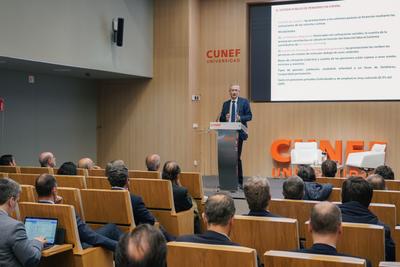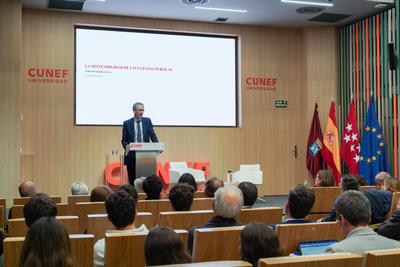
Pablo Hernández de Cos focuses on productivity in the last seminar on “Structural Challenges of the Spanish Economy”
April 1, 2025

The seminar series on “Structural Challenges of the Spanish Economy” came to an end last Tuesday, 1 April. In the fourth and final session, Pablo Hernández de Cos, former Governor of Banco de España (2018-2024), incoming Managing Director of the Bank for International Settlements (July 2025) and CUNEF alumnus, talked about productivity in Spain. During the session, Mr Hernández de Cos went over the recent evolution of productivity and its relationship with firm size and dynamics, with human, physical and technological capital, and with trust in Spanish institutions, stressing the following key insights:
- We have witnessed less dynamism in the Spanish economy versus the European average. Low productivity explains a per-capita income below the EU average.
- The small average size of Spanish companies limits productivity growth due to their limited leverage of economies of scale. In recent years, large companies account for the lion’s share of employment, but there’s still great room for improvement compared to other European countries.
- Over-regulation negatively affects business growth, and the situation calls for numerous and diverse reforms to reduce and simplify bureaucracy. In this sense, Europe and Spain have proposed creating virtual administrations (28th member, 18th autonomous region) to implement best practices in business regulation.
- Education impacts both business growth and productivity, as well as individual income. Even so, the educational level of the Spanish population remains below the EU average, limiting productivity growth.
- The main challenges faced by the Spanish education system are reducing the dropout rate, enhancing Vocational Training—especially Dual Vocational Training—, adapting the education system to a changing technological environment and improving financial education.
- The low growth in productivity is also due to a lower presence of innovation and intangible assets. Spain needs to implement a stable regulatory and institutional framework, easier access to external financing for investment projects, and more efficient tax incentives for innovation, among other measures.
- The institutional framework and economic actors’ trust in government institutions determine long-term growth. However, since the financial crisis, Spain has suffered a more pronounced drop in institutional trust and quality than other European countries.
- There is room for improvement in regulatory quality, which negatively impacts firm size, productivity and the efficiency of the legal system. In addition, Spain needs to improve the effectiveness and efficiency of its public administrations, as this would contribute to increasing productivity and would have a positive spill-over effect on private sector spending, investment and innovation decisions.
In the four sessions of this seminar series organised by CUNEF Universidad, Pablo Hernández de Cos has analysed issues that are key to Spain’s economic growth and social welfare, namely housing, deficit and public debt, pensions, and productivity.
